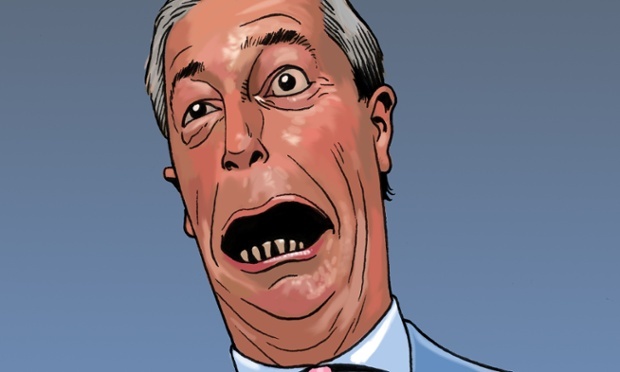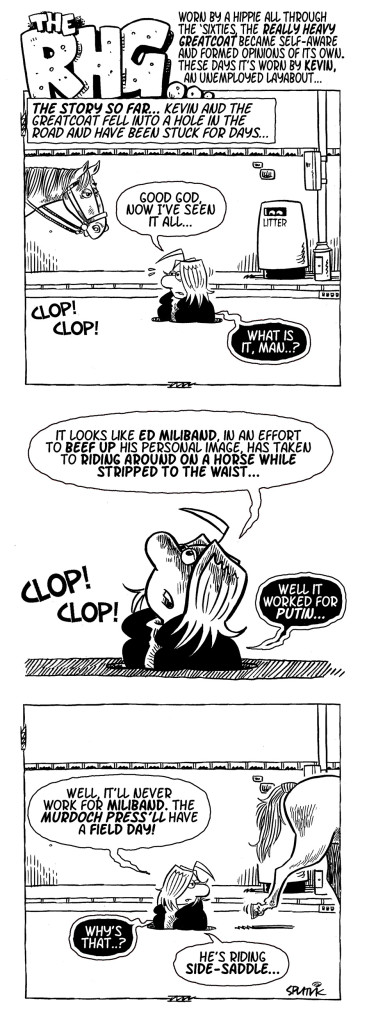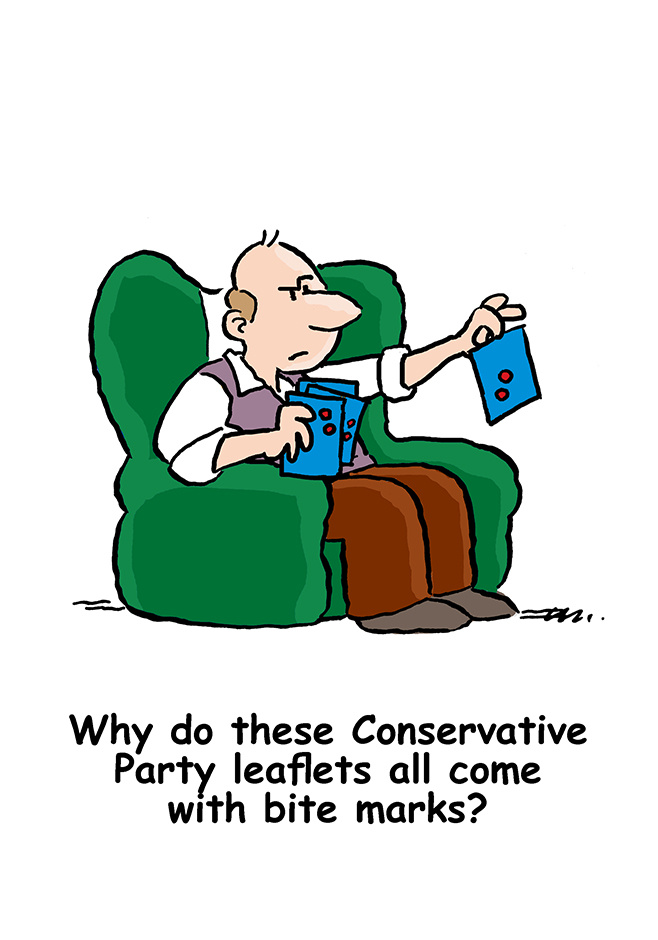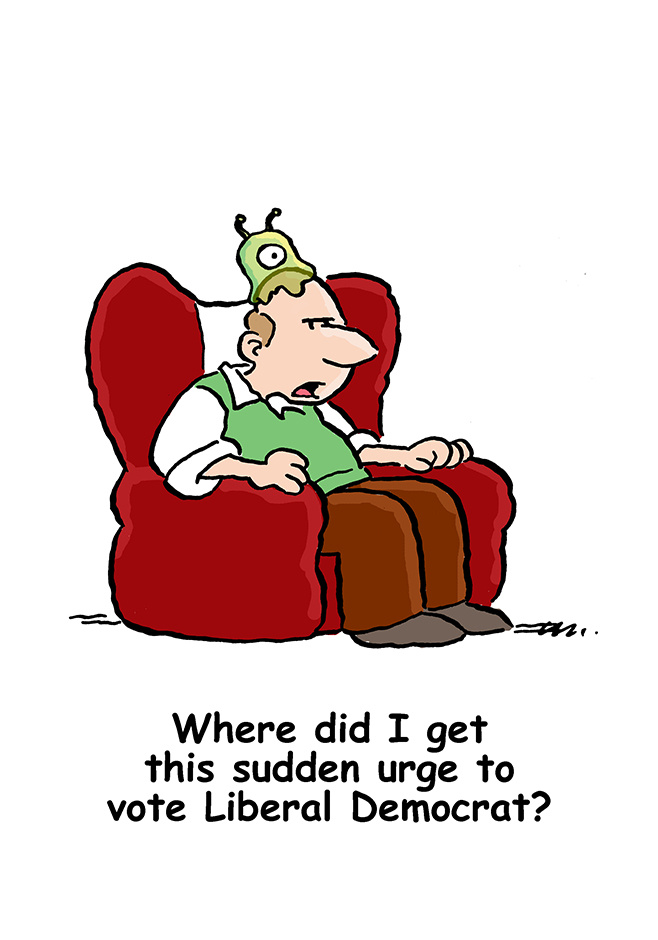
“Bilious Barrage” made an appearance in the recent Judge Dredd Megazine story “People LIke Us” written by Ian Edginton and drawn by Dave Taylor. 2000AD and its companion titles have a long tradition of political satire. Image © 2000AD
Beyond the world of comics, Britain is in the grip of election fever – and some election issue have been the subject of a recent Judge Dredd Megazine story “People Like Us”, quite apart from politicians attracting the barbs of political cartoonists such as The Guardian‘s Steve Bell, The Times Gary Barker and the Daily Telegraph‘s Matt in the national newspapers and many others, including Nick Miller, Tom Humberstone and Nigel Auchterlounie. But what are the different parties plans for the arts, whose funding affects some major comic festivals, some comic creator workshops run by literary organisations and council-run venues such as libraries and museums?
The Arts Council has published a summary of the main manifestos for the 2015 General Election, noting that overall there is greater prominence for the arts, culture and the creative industries than in 2010. With less than two weeks to polling day, here are the headline arts policies and included links to the manifestos so you can examine them in more detail if you wish.
The Conservative manifesto commits to maintaining free access to museums and galleries and supporting plans for the Factory in Manchester, an India Gallery at Manchester Museum, a Great Exhibition in the North and a new concert hall in London. They also promise to maintain and potentially extend tax reliefs for the arts and creative industries and deliver free Wi-Fi and support for e-books in libraries.

“The RHG” by Nick Miller . The Really Heavy Greatcoat © John Freeman & Nick Miller
The arts section in Labour’s manifesto opens with a commitment to a universal entitlement to a creative education for all young people through schools and after-school clubs. They also mention the “need to help our children develop the creativity, self-awareness and emotional skills they need to get on in life” in the education section. Institutions that receive arts funding would need “to open their doors to young people” and Labour would “work with public bodies to rebalance arts funding across the country”.
Their other arts policies are to continue free access to museums and galleries, introduce a Prime Minister’s Committee on the Arts, Culture and Creative Industries and deliver more creative apprenticeships.
The Liberal Democrats include arts and creativity in their policies on ‘building a sustainable economy’ and commit to supporting creative skills, apprenticeships and small businesses and cultural tourism. They also pledge to maintain free museums and galleries while giving them greater autonomy. Arts and culture inform their thinking in other areas too: there is a commitment to ‘promote evidence-based ‘social prescribing’ of sport, arts and other activity’ in healthcare and to nurture creativity in schools.
#GE2015 #UKIP pic.twitter.com/cnVkODifRP
— Spleenal (@spleenal) April 17, 2015
UKIP devotes two separate sections to matters relating to arts and culture. They have a section labelled ‘British Culture’ which you can link to here and a section labelled ‘Heritage and Tourism’ which you can link to here. Specific arts policies include the abolition of the Department for Culture, Media and Sport with responsibilities folded into other departments. They would establish a Minister for Heritage and Tourism in the Cabinet office and support local arts projects in seaside towns.
The Greens (who seem to not been featured much in Election cartoons, other than by Steve Bell who took for a time to featuring patry leader Natalie Bennett as a pile of green) promise to reduce VAT to 5 per cent for live performances, give local authorities powers to support live performances in the arts with local funding and support initiatives to make culture available to all.
They were the only party to include a specific spending commitment on the arts – to increase arts funding by £500m a year – but you can link to the overall spending plans for the Conservatives, Labour, Lib Dems and UKIP here.
(Over the past few days a Green Party plan to limit the length of copyright – which is not in their manifesto – has been savaged by writers and artists, including Philip Pullman prompting the Greens Brighton MP Caroline Lucas to call on her party to review the proposal as a matter of urgency)
Arts funding is devolved in Scotland and Wales. Plaid Cymru published their manifesto on 31 March and the Scottish National Party, who started the Creative Scotland project, have outlined their arts policy here, saying they are committed to putting culture at the heart of their plans to develop Scotland’s overall prosperity.
• The General Election takes place on 7th May 2015. If you haven’t registered to vote, you’re too late.
• Stepping back in time, the Manchester Evening News reports University of Manchester Library’s John Rylands Library is highlighting a handful of 19th century satirical prints dating from the 1874 general election
• Daily Telegraph cartoonist Matt’s General Election 2015
• General Election cartoons on Cartoon Stock
• Glasgow’s Leiper Fine Art are showing political cartoons at their city centre gallery, and London’s Ellwood Atfield Gallery also has an exhibition of the hits and misses of election propoganda
The founder of downthetubes, which he established in 1998. John works as a comics and magazine editor, writer, and on promotional work for the Lakes International Comic Art Festival. He is currently editor of Star Trek Explorer, published by Titan – his third tour of duty on the title originally titled Star Trek Magazine.
Working in British comics publishing since the 1980s, his credits include editor of titles such as Doctor Who Magazine, Babylon 5 Magazine, and more. He also edited the comics anthology STRIP Magazine and edited several audio comics for ROK Comics. He has also edited several comic collections, including volumes of “Charley’s War” and “Dan Dare”.
He’s the writer of “Pilgrim: Secrets and Lies” for B7 Comics; “Crucible”, a creator-owned project with 2000AD artist Smuzz; and “Death Duty” and “Skow Dogs” with Dave Hailwood.
Categories: Creating Comics, downthetubes Comics News, Other Worlds


 Eagle Times soars again, exploring lost Dan Dare play
Eagle Times soars again, exploring lost Dan Dare play  Telos Publishing opens orders for The Fantastic Art of Ron Turner
Telos Publishing opens orders for The Fantastic Art of Ron Turner  Prince Valiant Artists illustrators Special #19 Limited Edition announced
Prince Valiant Artists illustrators Special #19 Limited Edition announced  What, Me Worry? At of MAD exhibition at the Norman Rockwell Museum
What, Me Worry? At of MAD exhibition at the Norman Rockwell Museum